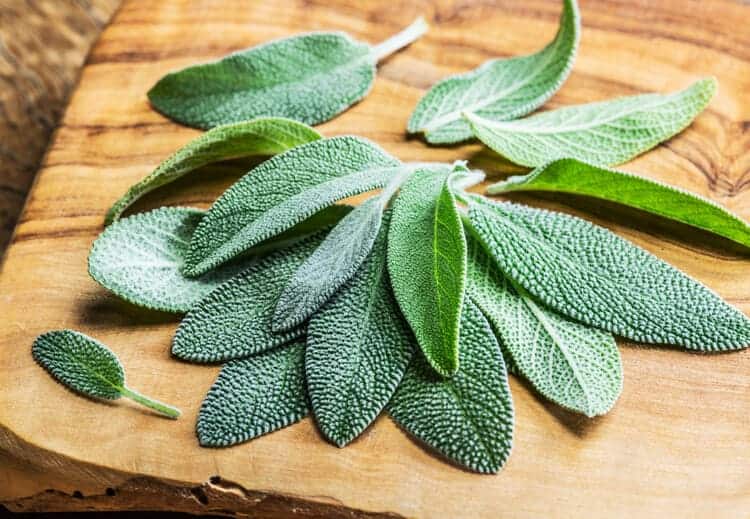
Whether you’re in perimenopause or menopause, hot flashes can be one of the most uncomfortable and frustrating symptoms.
The sudden surges of heat and sweating can disrupt the simplest daily tasks, leaving you feeling drained and overwhelmed.
And even though hot flashes often fade away with time, you don’t have wait.
There are natural remedies that can start giving you relief sooner than later.
And in this article, we’re going to explore those remedies by focusing on the top herbs for menopause hot flashes (and how to use them).
NOTE: This article contains some affiliate links and I earn a commission (at no additional cost to you) if you use them to make a purchase.
12 HERBS TO RELIEVE MENOPAUSE HOT FLASHES NATURALLY
1. Hops
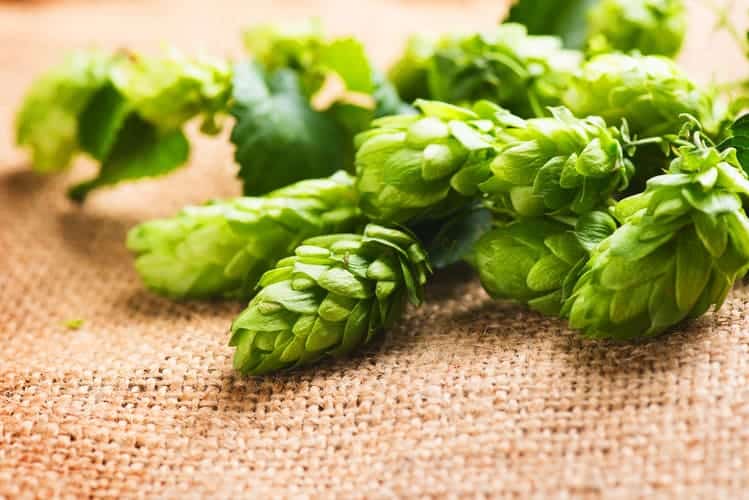
As the key ingredient in beer, you might be surprised to learn that the hop plant may also be beneficial for hot flashes.
This is according to a randomized, placebo-controlled study that was done with 120 postmenopausal and premenopausal women, ranging in age from 40 – 60 (source).
The women were randomly split into two groups as follows:
- One group received a tablet containing 500mg of the flowering part of the hop plant, plus 100 mcg of prenylnaringenin (a phytoestrogen found in hops).
- The other group received a placebo pill.
Both groups took one pill per day for 90 days.
During the study, the number of hot flashes the women experienced was measured at 4, 8 and 12 weeks.
At each stage, the researchers found that the women taking the hops pill had a significantly lower number of hot flashes.
In another study, 67 menopausal women were given either (source).:
- Hop extract containing 100mcg of prenylnaringenin.
- Hop extract containing 250mcg of prenylnaringenin.
- Placebo.
After 6 weeks, the two groups taking the hops extract showed more noticeable improvements in menopause symptoms – particularly hot flashes.
2. Sage
Besides being a delicious culinary herb, sage has historically been used as a natural remedy for hot flashes.
This herb is classified as an astringent, which means it regulates fluids – including sweat – in the body.
It’s no surprise then, that countries like Germany approve the use of sage for hyperhidrosis aka excessive sweating (source).
In addition, a study published in 2011 showed that menopausal women who took sage tablets for 8 weeks experienced significant improvements in hot flashes compared to those who took a placebo (source).
Specifically, the mean number of hot flashes per day improved as follows:
- Mild hot flashes: 46% decrease.
- Moderate hot flashes: 62% decrease.
- Severe hot flashes: 79% decrease.
- Very severe hot flashes: 100% decrease.
3. Maca
As an adaptogen – i.e. a plant that supports our stress response system – maca root has gained popularity as one of the best remedies for menopause-related symptoms.
Maca’s ability to support women during menopause comes mainly from the fact that it supports proper function of the hypothalamus and pituitary glands (source).
These two glands control everything related to hormone production.
In addition, maca is a cruciferous root vegetable and like all cruciferous foods, it contains glucosinolates.
These glucosinolates are compounds that are known for being anti-inflammatory.
Since some research suggests that there’s a link between inflammation and hot flashes, this might be one reason why some women experience relief when taking maca supplements (1, 2).
Lastly, a small study showed that regular consumption of gelatinized (aka cooked) maca resulted in a reduction of hot flashes (source).
For a deeper dive into maca and brands to choose from, read this guide on the best maca supplement for menopause.
4. St. John’s Wort
St. John’s Wort (SJW) is an herb that is known for having a calming effect on the nervous system. And research suggests that this calming effect extends to hot flashes as well.
In a randomized, double-blind, placebo-controlled study 100 women were given either a 100mg extract of SJW or a placebo for 8 weeks.
The study showed that the St. John’s Wort group had more significant improvements in (source):
- The frequency and severity of hot flashes after 4 weeks and 8 weeks.
- The duration of hot flashes after 8 weeks.
In another study, the combination of St. John’s Wort and black cohosh was shown to improve hot flashes after 16 weeks, compared to placebo (source).
5. Evening Primrose Oil
Extracted from the seeds of the evening primrose plant, evening primrose oil is rich in the essential fatty acid, gamma-linolenic acid (GLA).
This fatty acid has anti-inflammatory properties that may ease hot flashes.
According to a 6-week randomized clinical trial with 56 menopausal women, those who took evening primrose daily experienced the following improvements in hot flashes (source):
- Frequency: 39% improvement.
- Severity: 42% improvement.
- Duration: 19% improvement.
It’s worth noting that the changes for the placebo group were as follows:
- Frequency: 32% improvement.
- Severity: 32% improvement.
- Duration: 18% improvement.
So, overall the placebo and SJW groups had pretty similar results. The SJW group had the most improvements when it came to severity of hot flashes.
In another study, postmenopausal women were given either 1000mg of evening primrose (twice a day) or a placebo.
In this case, the mean scores for the frequency, severity and duration of hot flashes didn’t change between both groups. However, the frequency and severity of night sweats did improve for the evening primrose group (source).
So, as with many other plants on this list, evening primrose oil might be a promising hot flash remedy (but results vary depending on the study).
6. Panax Ginseng
Panax ginseng is an adaptogen and herbalists sometimes use it for menopause symptoms, including hot flashes.
One of the reasons why some herbalists rely on this herb is because stress can trigger hot flashes.
By using an adaptogenic plant like ginseng, you support your adrenals – which are part of your stress response system.
As such, you quiet down the various processes that ultimately lead to a hot flash (and you also support overall hormone balance).
7. Red Clover
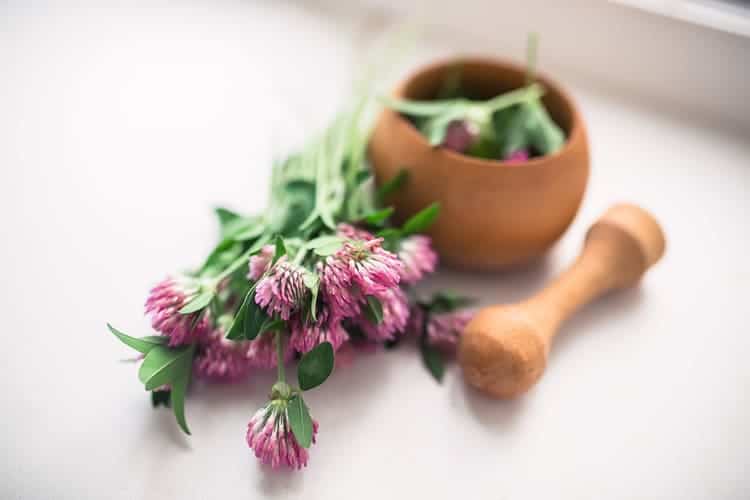
As a natural source of phytoestrogens called isoflavones, red clover is one herb that many women reach for when they’re experiencing hot flashes.
Not only has this herb been traditionally used to support women’s hormones, but several studies also confirm its benefits for women in menopause.
In fact, a review of 11 red clover studies found that the mean hot flashes in those studies were lower than the control groups (source).
Furthermore, this herb is known for supporting bone health and may also be helpful for menopause mood swings.
8. Black Cohosh
Similar to red clover, black cohosh is one of the most popular herbs for menopause symptoms.
While anecdotal evidence indicates that it’s helpful, the research on black cohosh and hot flashes is split.
For example, a review of black cohosh studies showed that it reduced hot flashes and night sweats by 26% (source).
Yet, other studies showed that it was no more effective than placebo.
Overall, some experts state that while there is value in black cohosh for menopause, there is a need for better quality studies.
9. Licorice Root
Licorice root contains isoflavones that activate estrogen receptors. As a result, licorice root helps to increase estrogen levels.
And some studies have confirmed that this root can in fact reduce hot flashes. For example:
- One study with menopausal found that those who took a licorice supplement for 8 weeks had a more significant reduction in the frequency, intensity and severity of hot flashes (compared to placebo) – source.
- Another study compared the effects of licorice root with hormone replacement therapy for 90 days. The licorice and HRT were pretty similar in their ability to reduce the number of hot flashes and duration of hot flashes. On the other hand, HRT was found to be more effective at reducing the severity of hot flashes (source).
10. Dong Quai
Sometimes called the “female ginseng,” dong quai is used in Traditional Chinese Medicine for a variety of women’s health concerns.
As is often the case with herbs, there are not a ton of studies on dong quai. In fact, there’s one study on this herb and it didn’t show a positive effect on hot flashes.
However, true practitioners of Traditional Chinese Medicine have pointed out that the preparation used in the study was not similar to what they would use (source).
This is yet another reason why it’s so important to work with someone who has a good grasp of the history and traditions surrounding herbal medicine.
So, while the research on dong quai and hot flashes is limited, anecdotal evidence and a long history of use – for over 1200 years – indicate that this is an herb worth looking into.
11. Peppermint
If you’ve ever applied peppermint to your skin then you know it has a very cooling effect.
So, not surprisingly, it is one of the best herbs for hot flashes.
Peppermint’s cooling effect comes from its high menthol content.
In addition, peppermint reduces tension in the body and some classify it as a nervine i.e. an herb that supports the nervous system.
Given that hot flashes are linked to an imbalance in the nervous system, this may be yet another reason why peppermint soothes hot flashes.
One thing to note about peppermint is that the essential oil is most popular for hot flashes.
While the tea could still provide benefits, the essential oil gives you higher amounts of menthol.
12. Hibiscus
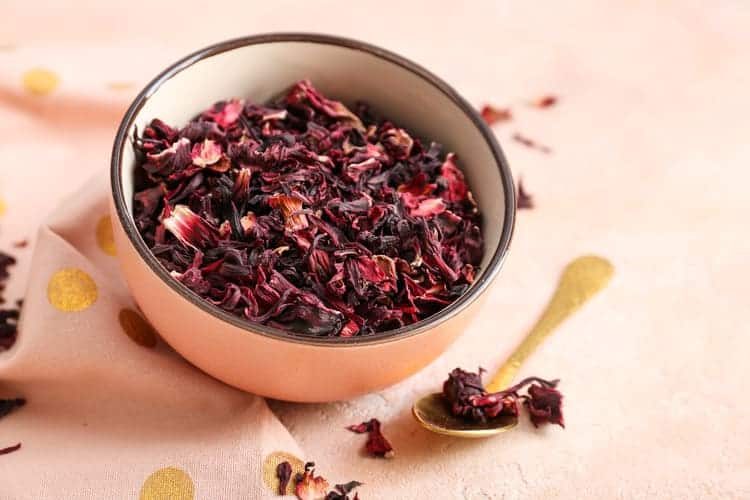
In the Ayurvedic (ancient Indian) medical system, hibiscus is classified as a cooling herb.
Furthermore, Ayurveda sees hot flashes as an excess of pitta (which is one of the three energies that each human has).
One of the qualities of pitta is “hot.” So, an excess of pitta leads to overheating of the body and symptoms like hot flashes.
While there isn’t research on hibiscus and hot flashes, hibiscus is often found in some hormone-balancing supplements.
As a side perk, hibiscus has traditionally been used to lower blood pressure and some modern studies have confirmed this (source).
This matters during menopause because blood pressure tends to rise after menopause (source).
Interestingly, high blood pressure – just like hot flashes – is classified as a pitta imbalance in Ayurveda.
And furthermore, research suggests that there may be a correlation between hot flashes and higher blood pressure during menopause (3, 4).
BEST HERBAL SUPPLEMENTS FOR HOT FLASHES & NIGHT SWEATS
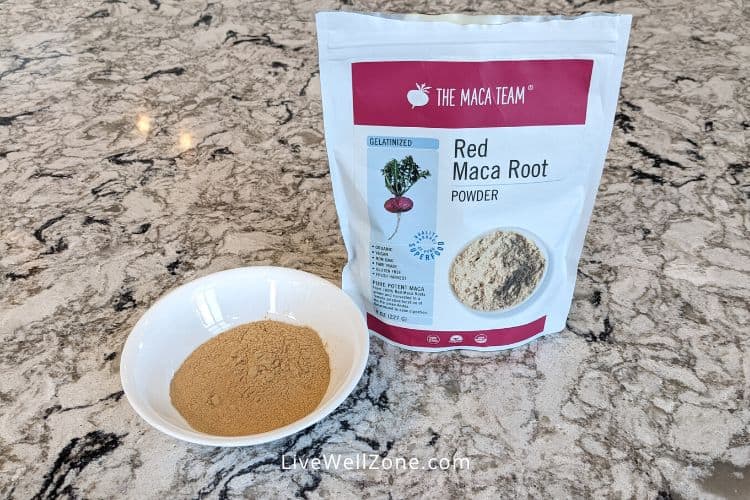
When it comes to individual herbs, I like these brands:
- Maca Team: they specialize in making maca products only. They are my go-to whenever I want to add maca into my routine. Get Maca Team’s red maca powder here.
- Herb Pharm: for herbs like sage, dong quai or black cohosh, Herb Pharm is an excellent option. As a brand, they make only herbal extracts and have maintained high standards (and a solid reputation) for decades. Find your Herb Pharm herbal extract here.
By the way, if you’d rather skip individual herbs and use a blend of herbs instead, use this list of menopause supplements for hot flashes to find a product that suits you.
CONCLUSION
Hot flashes can seem like an insurmountable symptom (along with everything else that comes with menopause).
However, remember that symptoms are just an indication that your body needs more care.
Of course, what works for one woman won’t always work for the next (because we all come with a different health history and you have unique needs beyond the fact that you’re going through menopause).
So, take some time to evaluate your options – be it herbs, dietary changes, self care/stress management techniques and more.
See which of the options resonate with you and where you are.
Then start incorporating that into your routine.
Whichever option(s) you go with, remember that you are building a lifestyle to support your health (it’s not just about a quick fix).
This approach will ensure that you thrive now and well beyond menopause!
You Might Also Like:
The 7 Best Balancing Herbs for Menopause Mood Swings
Top 10 Menopause Supplements for Hot Flashes | Powerful Natural Relief
Estroven vs Happy Mammoth: Which Is Best for Menopause Symptoms?
Best Milk For Menopause: Dairy vs Plant-Based
How To Use Peppermint Oil For Hot Flashes
Perimenopause Diet: A Definitive Guide for Better Sleep, Hot Flashes, Healthy Weight & More
How to Go Through Menopause Naturally: 7 Steps To Start Using Today
Essential Oils for Menopause: 11 Best Oils For Relief and How To Use Them
10 Powerful Herbs for Menopause Weight Gain (+ Best Supplements)
Hormone Balancing Diet Guide: Anti-inflammatory Foods, Vitamins and Tips for Women
DIY Essential Oil Spray For Hot Flashes: 5 Recipes To Use
Hibiscus Tea and Menopause: Benefits For Weight, Hot Flashes and More
The Only Essential Oil Roller Recipe For Hot Flashes You’ll Ever Need

